HLTH 4000 (HLTH4000)
Walden University
Page 2 out of 51 results
Sort by
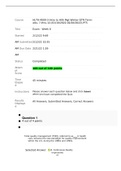
-
HLTH 4000-3 Week 6 Final Exam; Score; 100 Points (Feb 2022)
- Exam (elaborations) • 15 pages • 2022
-
- $22.49
- + learn more
1. Question: Total quality management (TQM), referred to as in health care, became the new paradigm for quality improvement within the U.S. during the 1980s and 1990s. 2. Question: Strategic plans translate broad strategies into specific objectives and action plans. 3. Question: Patients are most likely to complain about the medical care they receive far more than about food or noise or other nonclinical concerns. 4. Question: Which of the following stakeholder groups ...
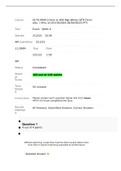
-
HLTH 4000-3 Week 6 Final Exam Answers; Score; 100 Points (Winter QTR)
- Exam (elaborations) • 16 pages • 2022
-
- $22.49
- + learn more
1. Question: Without planning, a task that must be done usually takes more time than it would if planning preceded its performance. 2. Question: Whenever possible, you should give your employees the authority to address and resolve customer complaints. 3. Question: What is the purpose of the planning assumptions in development of the volume forecast? 4. Question: A plan should include the planner's assessment of how customers and employees may be affected by changes caused by the plan. 5. Q...
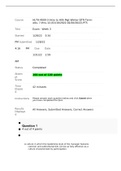
-
HLTH 4000-3 Week 3 Midterm Exam (Score; 100 Points)
- Exam (elaborations) • 15 pages • 2022
-
- $22.49
- + learn more
1. Question: A culture in which the leadership style of the manager features ... culture characterized by participation 2. Question: The second strongest form of leadership is leadership by example. 3. Question: The administration of a budget is an integral part of the basic management function of coordinating. 4. Question: To encourage a service-oriented culture, effective supervisors: 5. Question: The fundamentals of consensus decision making do not include:. 6. Question: The supervisor'...
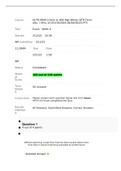
-
HLTH 4000-3 Week 6 Final Exam Answers; Score; 100 Points (Winter QTR).docx
- Exam (elaborations) • 16 pages • 2022
-
- $25.48
- + learn more
1. Question: Without planning, a task that must be done usually takes more time than it would if planning preceded its performance. 2. Question: Whenever possible, you should give your employees the authority to address and resolve customer complaints. 3. Question: What is the purpose of the planning assumptions in development of the volume forecast? 4. Question: A plan should include the planner's assessment of how customers and employees may be affected by changes caused by the plan. 5. Qu...
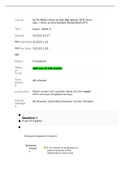
-
HLTH 4000-3 Week 6 Final Exam; Score; 100 Points (Spring 2022)
- Exam (elaborations) • 16 pages • 2022
-
- $25.48
- + learn more
1. Question: Employee Suggestion Programs: 2. Question: Major federal law affecting HR primarily addresses: 3. Question: A "health service [that has] risks [that] outweigh its benefits" is the definition of which of the following terms? 4. Question: There are some health care provider organizations that have no internal customers. 5. Question: What is the department manager's role in strategic planning? 6. Question: Total quality management (TQM), referred to as in health care, became the n...
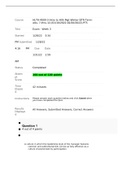
-
HLTH 4000-3 Week 3 Midterm Exam (Score; 100 Points)
- Exam (elaborations) • 15 pages • 2022
-
- $25.48
- + learn more
1. Question: A culture in which the leadership style of the manager features ... culture characterized by participation 2. Question: The second strongest form of leadership is leadership by example. 3. Question: The administration of a budget is an integral part of the basic management function of coordinating. 4. Question: To encourage a service-oriented culture, effective supervisors: 5. Question: The fundamentals of consensus decision making do not include:. 6. Question: The supervisor'...
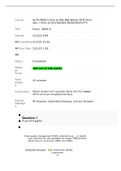
-
HLTH 4000-3 Week 6 Final Exam; Score; 100 Points (Feb 2022)
- Exam (elaborations) • 15 pages • 2022
-
- $25.48
- + learn more
1. Question: Total quality management (TQM), referred to as in health care, became the new paradigm for quality improvement within the U.S. during the 1980s and 1990s. 2. Question: Strategic plans translate broad strategies into specific objectives and action plans. 3. Question: Patients are most likely to complain about the medical care they receive far more than about food or noise or other nonclinical concerns. 4. Question: Which of the following stakeholder groups ...
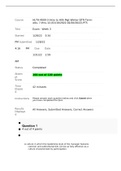
-
HLTH 4000 Special Topics in Public Health Week 3 Midterm Exam
- Exam (elaborations) • 15 pages • 2022
-
- $15.99
- + learn more
1. Question: A culture in which the leadership style of the manager features ... culture characterized by participation 2. Question: The second strongest form of leadership is leadership by example. 3. Question: The administration of a budget is an integral part of the basic management function of coordinating. 4. Question: To encourage a service-oriented culture, effective supervisors: 5. Question: The fundamentals of consensus decision making do not include:. ...
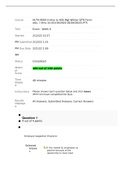
-
HLTH 4000 Introduction to Healthcare Management Week 6 Final Exam (100 points) v1
- Exam (elaborations) • 16 pages • 2022
-
- $15.99
- + learn more
1. Question: Employee Suggestion Programs: 2. Question: Major federal law affecting HR primarily addresses: 3. Question: A "health service [that has] risks [that] outweigh its benefits" is the definition of which of the following terms? 4. Question: There are some health care provider organizations that have no internal customers. 5. Question: What is the department manager's role in strategic planning? 6. Question: Total quality management (TQM), refe...
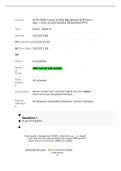
-
HLTH 4000 Introduction to Healthcare Management Week 6 Final Exam (100 points)v2
- Exam (elaborations) • 15 pages • 2022
-
- $15.99
- + learn more
1. Question: Total quality management (TQM), referred to as in health care, became the new paradigm for quality improvement within the U.S. during the 1980s and 1990s. 2. Question: Strategic plans translate broad strategies into specific objectives and action plans. 3. Question: Patients are most likely to complain about the medical care they receive far more than about food or noise or other nonclinical concerns. 4. Question: Which of the following stakeholder groups ...

How did he do that? By selling his study resources on Stuvia. Try it yourself! Discover all about earning on Stuvia


